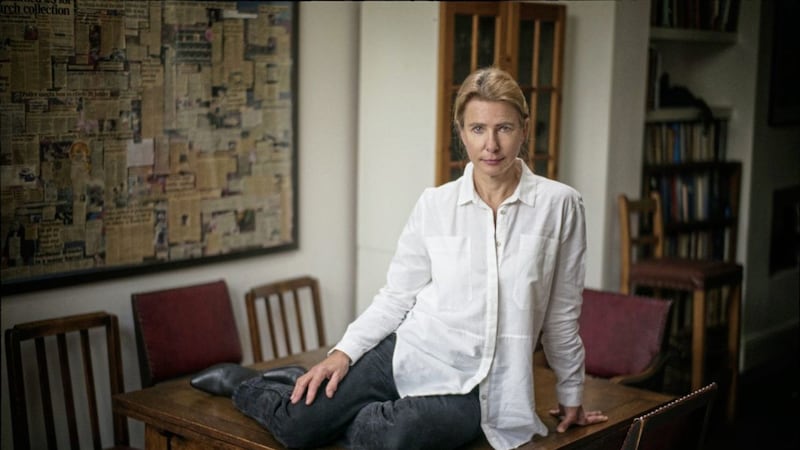LIONEL Shriver is pondering her particular brand of humour and agrees that sometimes people take it "out of context", leading her into yet another media storm about something she said or didn't say quite the right way to appease and please the masses.
But, if you are intending to go hear her caustic, straight-talking, often tongue-in-cheek opinions at the upcoming Imagine Festival in Belfast, you will probably be aware already that the award-winning We Need To Talk About Kevin author is very much her own woman, with no time for posturing or "fake hand-wringing" over the latest PC cause celebre.
"I'm not a big subscriber to orthodoxies, so I find the current hypersensitivy around race, creed, disability, you name it, a bit constraining," she says. "It's not that I'm keen to be able to hurt other people's feelings right, left and centre, but, certainly, if your whole purpose in writing something is not to offend people, then it's probably not going to be very good.
"I've been very vocal about defending the right of people to write whatever they like, but that doesn't keep you from having an opinion about it. There's a difference between saying 'I don't like that' and 'You shouldn't be allowed to publish that' and I'm afraid we've been moving toward the latter."
Free speech isn't the safe place it used to be either: "People do take my sense of humour out of context. There I am, having a laugh, but there is a certain type of audience that is simply too dour to get it..."
No need to take offence, though, as she quickly stresses that Northern Ireland audiences are not included in that reference. Apparently, we can read her like a book.
"The people I hung out with when I lived in Belfast had a real sense of humour – and I am a sucker for that," reflects the American-born author, who lived in Belfast for 12 years after arriving in the 80s to research her third novel, Ordinary Decent Criminals. "There was always plenty of room for jokes, no matter what was happening outside.
"The northern Irish are highly verbal, they like word play and love to talk – and that's right up my street. I really enjoyed my time there. It was also politically stimulating, like getting a tuition-free Phd in Conflict Studies."
Now based in London with her jazz drummer husband, Jeff Williams – the couple also have a home in New York – the writer is looking forward to a lively conversation with the BBC's William Crawley as part of a packed Imagine programme and says it will feel a little bit like 'coming home'.
"I do hope we don't get mired in Brexit, though, because the whole thing has become so hard and fast," she says flatly. "You're either on one side or the other and in Northern Ireland, everyone is familiar with that kind of attitude."
In one of her recent columns for The Spectator magazine, she writes with pithy enthusiasm on the subject, resenting the way the border is being "manipulated" and the way Northern Ireland is "being used as a tool to frustrate Brexit".
Watching the "statelet mercilessly deployed to subjugate and humiliate the UK", has, she asserts almost caused her – as an "Ulster unionist democrat" in outlook – to "slide into Irish nationalism" herself.
Brexit aside, there are are other, global political issues which keep this confirmed pessimist awake at night and she frets over what she terms the "anxieties of our times" such as population growth and running out of fresh water.
"I've been interested in demography since I was 16 years old and all the things that concern me are big potential problems," Shriver expands. "I am worried about running out of fresh water if the population pushes past nine billion and I think there will be increased pressure on western countries in relation to migration.
"But – and this is kind of creepy to get into – if my concerns are correct and these are issues that can destabilise civilisation, I'm not going to be around for the worst of it. I'm definitely on my way out and I find that something of a comfort. Also, I don't have any kids, so I'm kind of cheating."
It is difficult to decipher if this is another example of Shriver's under-the-radar humour thrown in as some random test, but she is deadly serious. It might be expedient to point out, though, she is only 62 and is just as disciplined over daily exercise as she is with her writing.
"I do try to look after myself and I play tennis a lot," she says. "I don't consider it optional and I have always been disciplined about that as exercise keeps me alive. Writing is such a sedentary occupation; if you don't try to counteract that, you fall apart."
Her most recent publication, Property, was published last year and is a collection of stories including a novella entitled Subletter, which is set in Belfast and inspired by "territorial" American visitors she observed while living here.
"It is about two women, both American, who are essentially fighting over who owns Northern Ireland – and, of course, it doesn't belong to either one of them," she explains. "I really noticed that type of rivalrous attitude from visitors when I was living in Belfast myself.
"They would compete with each other over who had the best grasp of the Troubles, who really understood what was going on. I found the whole theatre of that hilarious and I tried to capture it in a story."
Her next book – The Motion Of The Body Through Space – has just been submitted to her publisher and is something entirely different, taking a look at the cult of exercise.
"I found this interesting, because while I am keen on daily exercise, I do not regard it as the meaning of life," she adds. "I think it makes for a very poor religion and there are a lot of people who have turned it into their salvation."
With so much to say and so much to change, I wonder if she thinks she would have made a good politician – maybe knocked a few heads together at Stormont.
There is a dismissive snort down the line.
"I would have been appalling because I'm not very good at diplomacy," she laughs. "I don't know how to keep my mouth shut. I alienate people and I have an unusual capacity for ruffling feathers..."
Hmm... in Northern Ireland, that's pretty much... but no, I let it slide. In any case, she enjoys writing too much and knew she wanted to be a writer since she was seven.
"At that age, I was a big Curious George fan," Shriver recalls. "I liked a bit of mischief... and I have to say, I still do. That's why I don't like identity politics; they have no sense of mischief at all."
:: Lionel Shriver will be in conversation with William Crawley at Ulster University, Belfast, on March 25, 7.30-9pm (imaginebelfast.com).





